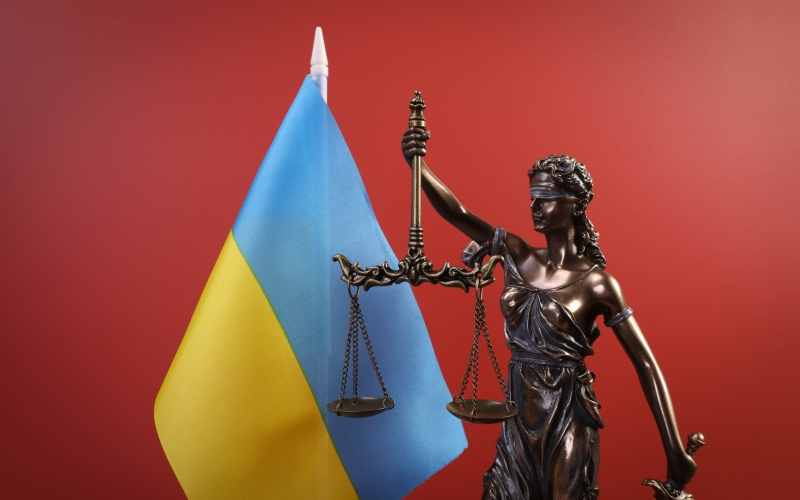Justice is Costly, but Also Priceless

Ukrainian forces are driving the Russian army back, and territories in the east and the south are changing hands. The war in Ukraine is a battle over territory, and this task needs to be completed. But we must also win the more fundamental battle of values.
Vladimir Putin started the war in Ukraine not because he is afraid of NATO, but because he is afraid of freedom. He started it eight years ago to stop Ukraine’s process of democratisation. This is the meaning of the Maidan revolution, and he saw it for what it was.
His strategy is to convince not only Ukraine but other nations around the world that values such as democracy, freedom and the rule of law are artificial. He wants Ukrainians, and people elsewhere, to believe that there is no point in democratising because democracy is not real.
When Russians shell a residential tower block, when they level a village, when they murder a civilian or rape a woman, they are making Putin’s point: if these values are real, why can’t they protect you?
To Putin, only physical force matters, namely an authoritarian regime ready to use all means necessary – not only arms and weapons, but also economics and diplomacy, cyberattacks and disinformation. These are the foundations of Putin’s idea of legitimacy.
So this is not only a war between two countries. It is a war between two systems: authoritarianism and democracy.
It is imperative to win this war, and for this Ukraine will continue to need weapons. It is strange to hear this from a human rights lawyer, but this is the case in Ukraine today. There is no other way.
But we must also fight for our values. We need to show that democracy can win, can protect and can provide a future. We need to show that democracy is real.
For Ukraine, this means democratic reform, strengthening institutions, building on the civic engagement started at Maidan. We have work to do, but we have a good base.
Yet this will not be possible unless people can believe in the rule of law. They must have faith in freedom and democracy. So, we have to show that democracy can work, that in a very material way, our values can protect you, even during a war.
This is why justice is essential. We have the chance to create a real democracy out of this war, but only on the basis of accountability. Justice is the critical tool that will enable us to deliver democracy.
There has been a period of serious disorder, when the whole international system could not protect us. This is clear to every Ukrainian. The failure of the “international system” is not theoretical to Ukrainians. They have lost loved ones, they have been tortured and abused, they have lost their homes and their livelihoods.
But we can show that we have fixed it. That justice is working, that perpetrators are held accountable. Not through new resolutions or conventions, or another international treaty. But through trials, though establishing criminal responsibility, through ratifying the truth.
Right now, Ukrainian victims have become numbers. As part of the effort by Ukrainian civil society groups to establish a Tribunal for Putin, we have over six months documented more than 15,000 criminal episodes. I have done many interviews. People have told me how they had been beaten, raped, electrodes attached to their genitals. One woman told me how her eye had been gouged out with a spoon.
I no longer know people and their biographies. Instead, I have numbers. I can tell you how many people in our database were killed, injured, abducted, tortured. I have all that data. The scale of the crimes is so huge, even I am making people into statistics.
Turning human life into numbers also ruins the value of human life.
We need accountability to give people back their names. In the first trial in Ukraine, the wife of the deceased said that her husband was not a famous politician or a known activist or a local opinion leader. He was an ordinary person. She said that, by holding the trial, the court showed that the life of an ordinary person was important. Her husband mattered.
Justice is also necessary for a sustainable peace. Russia is using war as a tool for its geopolitical interests. It has enjoyed impunity for decades, and the result has been Moldovia, Georgia, Syria, Ukraine. But despite this long trail of horrible crimes, there have been no prosecutions. So it continues. The war in Ukraine is a result of this total impunity.
There is an accountability gap we have to address. We have an overloaded national system, while the number of cases before the permanent international court will be small. This will require political will and resources. From my travels, I am concerned that there is not enough support for justice, especially from some key European countries.
This is a very costly machinery of investigation and court procedures. But it returns names to the people. It provides a foundation for democracy. It helps end the cycle of conflicts.
Justice is costly, but it is also priceless.
As told to Anthony Borden.
Oleksandra Matviichuk is a Ukrainian human rights lawyer who heads the Center for Civil Liberties, one of the 2022 Nobel Prize for Peace laureates.
The article was originally published on 7 October 2022 by the Institute for War and Peace Reporting under the title "Justice is Costly, but Also Priceless” as part of IWPR's Ukraine Justice Monitor.
